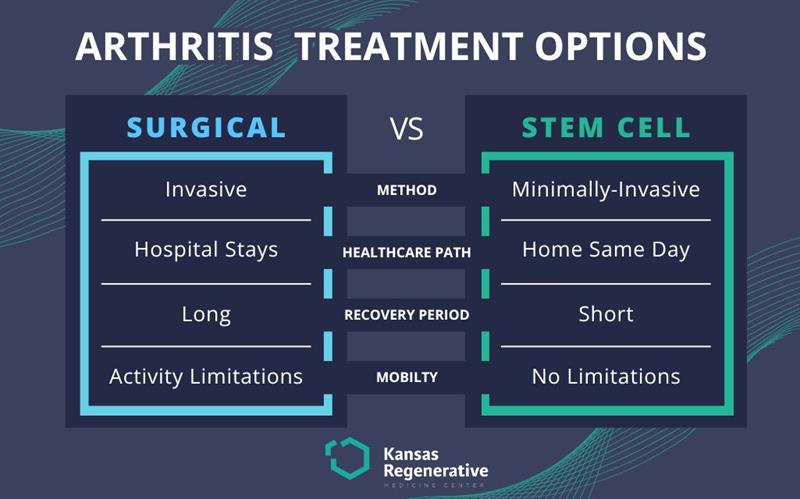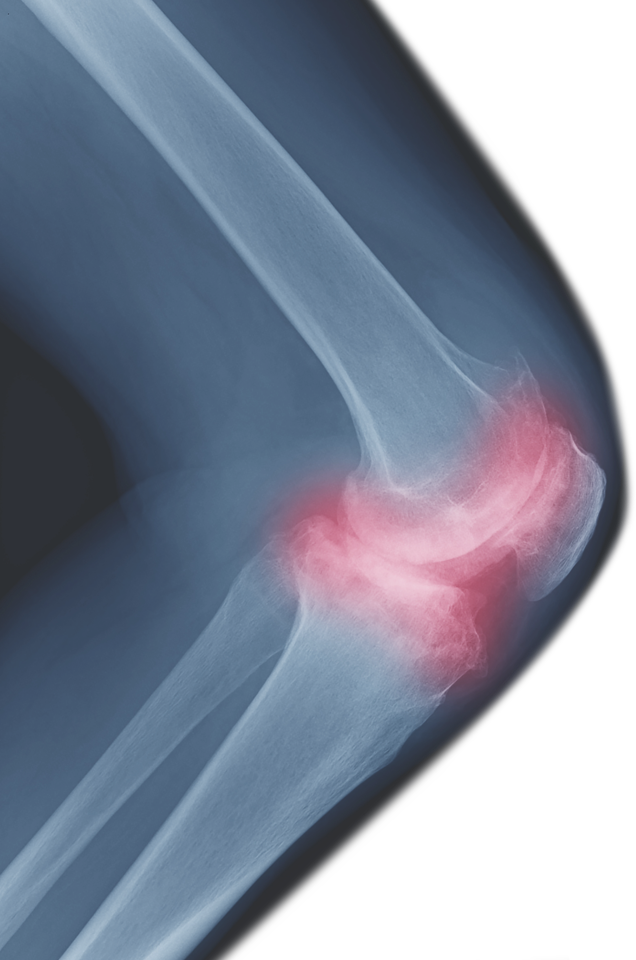KRMC Author
Regenerative Stem Cell Therapy: Alternative to Surgery for Arthritis Relief
Explore a Safer, Less Invasive Treatment Targeting the Root Cause of Joint Pain
Understanding Arthritis and Traditional Treatments
At Kansas Regenerative Medicine Center, arthritis consultations are among the most common patient visits. Arthritis affects millions of people worldwide and frequently targets major joints such as the knees, hips, shoulders, and hands. It often involves cartilage loss, joint inflammation, and progressive damage. Traditional treatments—such as anti-inflammatories, physical therapy, cortisone injections, and joint replacements—primarily manage symptoms and provide only temporary relief. While these methods can offer short-term comfort, they do not address the root cause or halt the disease’s progression.
The Limitations of Surgery
While joint replacement surgery can offer significant relief, it also comes with risks and limitations. The procedure is irreversible and may lead to complications such as infection, persistent pain, or even the need for revision surgery. Despite its effectiveness in some cases, joint replacement should be considered a last resort due to its permanent nature and the potential for long-term issues.

Exploring Alternatives to Surgery
Given the limitations of traditional and surgical treatments, patients and providers alike are seeking better options. Emerging therapies like regenerative stem cell therapy offer promising alternatives by targeting the root causes of arthritis—such as cartilage degradation and inflammation—rather than just treating symptoms. Regenerative stem cell therapy is particularly promising for major joints commonly affected by arthritis—such as the knees, hips, shoulders, and hands—where traditional treatments often fall short. These therapies have the potential to delay or even avoid the need for surgery altogether.
The Promise of Regenerative Medicine
Regenerative medicine represents a modern, science-backed alternative in arthritis care. Using the patient’s own stem cells, regenerative therapies aim to repair and regenerate damaged tissue within the joint. Unlike conventional methods, which focus solely on symptom relief, this approach targets the underlying issues—such as cartilage loss and inflammation—offering the potential for long-lasting improvement in function and quality of life.
Find out if regenerative stem cell therapy is right for you. Your path to lasting relief could be just a click away.
Are You a Candidate?
Benefits of Regenerative Therapy
The benefits of regenerative therapy make it an appealing option for many arthritis sufferers. Unlike surgery, regenerative treatments are minimally invasive and carry fewer risks. Because the patient's own cells are used, the procedure is generally safe and well-tolerated. In addition, regenerative therapy preserves the natural structure of the joint, allowing greater flexibility for future treatment options if needed.
Key benefits include:
- Minimally invasive approach, reducing recovery time and risk
- High safety profile with low complication rates
- Preserves the native joint, avoiding permanent surgical alterations
- Reduces the likelihood of revision surgeries
- Allows for future treatment options if needed
Incorporating Regenerative Medicine into Treatment Plans
As regenerative medicine continues to gain recognition, Kansas Regenerative Medicine Center supports its integration into arthritis treatment protocols. Offering regenerative therapy as an alternative to surgery is especially valuable for patients seeking long-term relief without the risks associated with invasive procedures. By including regenerative options in treatment planning, healthcare providers can offer more personalized, proactive care that aligns with each patient’s goals and lifestyle.
Regenerative medicine represents a hopeful alternative to traditional arthritis treatments and surgery. By addressing the root cause of the disease, it offers the potential for lasting relief and improved mobility—without the need for irreversible surgical intervention.
Frequently Asked Questions (FAQ's)
Stem cell knee injections are able to regenerate the cartilage in your knee joints and keep you out of the operating room. Stem cell injections are the most advanced regenerative treatments for the treatment of knee pain due to arthritis, degenerative conditions, traumatic ligament injuries, or meniscus tears.
After the first few weeks of recovery, patients generally report gradually increasing relief from their symptoms over the coming months. Stem cells will continue to repair the affected area for up to one full year following the first procedure, and many patients do not require more than one treatment session.
By deploying your own stem cells into the affected area, the therapy promotes healing, reduces inflammation, and accelerates tissue repair.
Many have been told that they require surgery or other risky treatments for their ailments and are looking for non-invasive options. Some have heard about the compelling testimonials about stem cells in the literature and on various websites. Many have read about the results of stem cell treatments in animal models and in humans. We give a choice to those informed patients who seek modern regenerative therapy but desire convenience, quality, and affordability. We fill a need for those patients who have been told that they have to travel to different countries and pay as much as one hundred thousand dollars for stem cell treatments offshore.
As of 2023, stem cell therapies are not typically covered by routine insurance. A few companies with private self-directed insurance and some workman's comp cover stem procedures.







